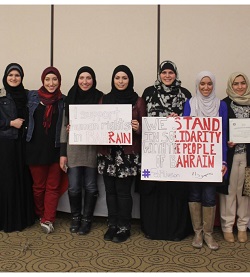Earlier this month, the people of Bahrain and those that work to promote human rights and reforms in the country marked the third year anniversary of the Bahrain uprising. Unfortunately, for many, it can be discouraging to watch coverage of events in Bahrain fade away as media outlets and Congress divert their attention to the clashes in Syria, the protests in the Ukraine, and the Dalai Lama’s visit to Washington, D.C. However, there is one tool that every person can utilize to ensure that governments do pay attention: constituent advocacy.
On 18 February, Students for Islamic Awareness and the Arab Student Union at University of Michigan Dearborn, in conjunction with Americans for Democracy and Human Rights in Bahrain (ADHRB), held an event to raise awareness about the human rights situation in Bahrain. Participants came together to hear panelists discuss the systematic government crackdown on innocent physicians and human rights defenders in an attempt to quell legitimate calls for human rights and democratic representation. The panelists included Brian Dooley, Director of the Human Rights Defenders program at Human Rights First, Dr. Qasim Omran, a Bahraini doctor who was sentenced to 15 years in prison in absentia, and Dr. Amal Yousef, a Bahraini physician. Attendees then translated the information they heard into action by signing letters to their senators and representatives in Congress, asking them to take a stand for human rights in Bahrain.
ADHRB has held similar community events in Connecticut and New Jersey, and the importance of such events must not be overlooked. It is this type of constituent mobilization that raises the profile of the grave human rights violations occurring in Bahrain to the national arena. Indeed, it was a constituent effort that led to the blocking of U.S. riot control material to Bahrain in November 2011, and this block continues to this day.
This is the beauty of representative government: citizens can join forces and make an impact through consistent engagement with their elected officials. It is exactly this idea of democracy that leads the people of Bahrain to protest in the streets and call for reform. In fact, by engaging our own government officials on the issue of human rights in Bahrain, we exercise the very rights denied to the Bahraini people. It is therefore our duty to speak up on their behalf in countries like the United States, United Kingdom, and Canada, as we fortunately possess the freedom to do so.
–
Saman Naquvi is the Grassroots Advocacy Associate at ADHRB.





